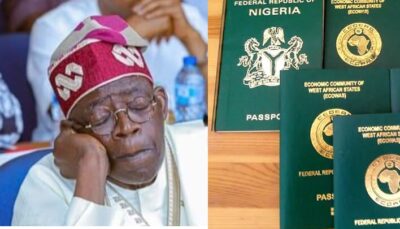Nigeria’s Passport Fee Hike Rekindles Old Wounds Of Controversy
With passport fees now doubled, government argues it is curbing bribery. Critics say the policy only entrenches corruption and deepens inequality.

Abuja, Nigeria — August 29, 2025
The Nigerian government has approved yet another sharp increase in passport application fees, effective September 1, 2025. Under the revised structure, a 32-page passport (five-year validity) will cost ₦100,000, while a 64-page version (ten-year validity) jumps to ₦200,000.
This comes barely a year after the 2024 passport fee increment, a move that was widely criticized as burdensome and regressive at the time. That controversy had barely settled before this fresh announcement reignited public outcry.
Temitope Ajayi, Senior Special Assistant to President Bola Tinubu on Media and Publicity, defended the hike on a post on Twitter. He argued that Nigerians have historically paid these amounts informally through bribes to immigration officers.
“Nigerians have always paid more than ₦100k and ₦200k … in bribes, to Immigration officers to get their passports out on time. The difference now is: the money will go into government coffers for same express service instead of private pockets,” Ajayi said.
The government claims that the policy will sanitize the system, capture lost revenue, and reduce corruption by formalizing what citizens were already paying unofficially, without information on how that is possible.
Ajayi’s defense, however, triggered a wave of anger on social media, where critics accused the government of being insensitive and out of touch.
A Twitter account by the name Adékúnlé Odérìndé (@AdekunleOderind) responded directly to Ajayi’s post:
“This is the most insensitive part of government appointees and elites gaslighting the citizens. Infact the new higher price will increase the bribery and money going to private pockets. You can’t eliminate fraud by increasing cost when you are not ready to address the human interface and inability of citizens to get passports seamlessly free of delay.”
Another user, Chikwado Anyanwụ (@chikwadoca), remarked:
“The difference is that more money will be paid to both private pocket and Tinubu’s government. Because the true express is that which is paid to the private coffers..”
Similarly, Babatunde Komolafe (@komodelaw1) added:
“Anyway, that’s the painful truth, but the issue is the money being generated ending up in the pockets of the legislators.”
The latest hike raises questions that go beyond passport administration. At a new ₦100,000 minimum threshold, the cost of a travel document now exceeds the monthly minimum wage of many Nigerians. Analysts argue that the hike risks turning international mobility into a privilege of the elite, undermining the government’s pledge of fairness.
Equally, the insistence that corruption can be “priced out” of the system by raising fees highlights a deeper structural problem: reliance on financial deterrents instead of systemic reform.
If anything, the latest measure underscores a widening trust deficit between the Nigerian state and its citizens—where official assurances are increasingly met with skepticism, and economic policy decisions are viewed less as reforms than as burdens.